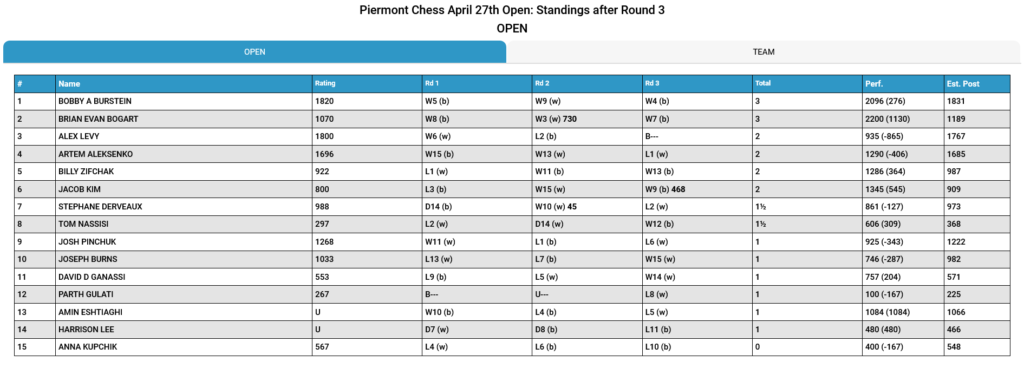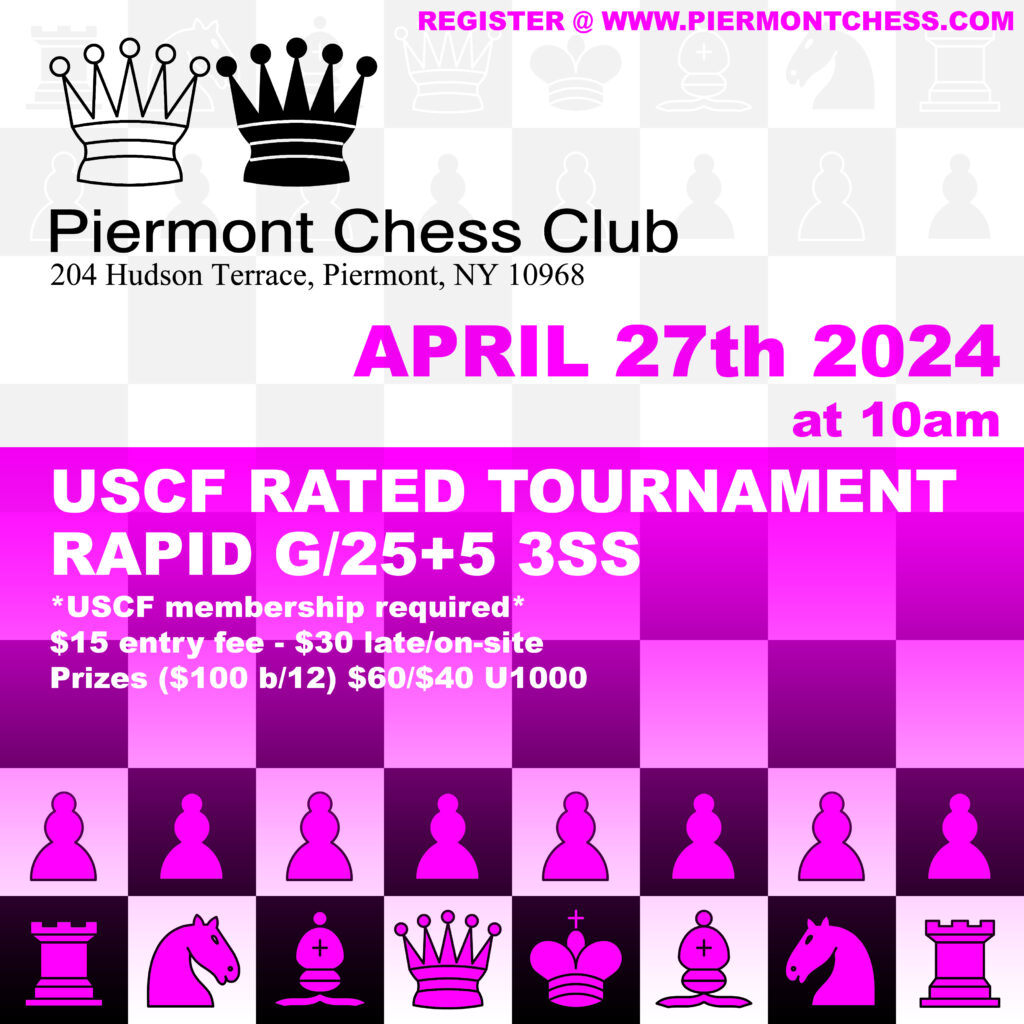The results are in for what turned out to be a surprisingly exciting spring tournament!
First prize went to Bobby Burstein and Brian Bogart who tied for first with perfects scores and split the prize!
The Best Under 1000 prize winners were Billy Zifchak and Jacob Kim who also tied with 2 pts each!
Congratulations to the winners and thank you to everyone who competed!
Select Games from the Tournament
Explore these 9 analyzed games! *Any discrepancies are due to legibility and other scoresheet inaccuracies. Desktop computers show engine analysis.
Stephane Derveaux vs. Joseph Burns
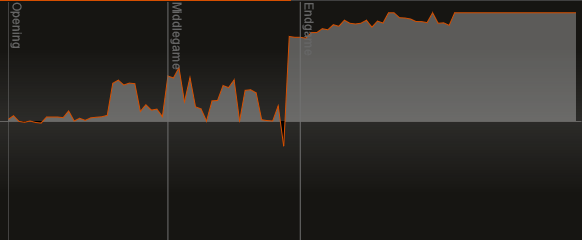

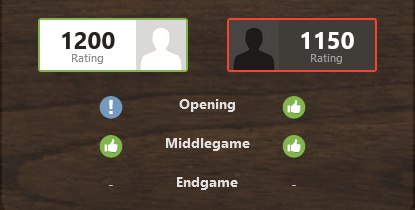
An intense and serious 50+ move game. Black opened with a great French Defense-Steiner Variation in response to 1. c4, but White was a cut above even that. Evolving into a kind of Scandinavian looking variation, development continued smoothly until the first real mistake at 15…fxg6?! White maintained pressure and was slightly ahead though the game was still anyone’s to win. Everything was decided with 26…b5?? where Black hung the queen. Black did their best to defend, but the imbalance was too much and White won with an eventual checkmate [not recorded] after promoting the a pawn.
Josh Pinchuk vs. Jacob Kim
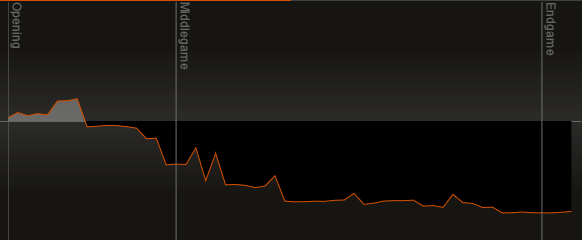

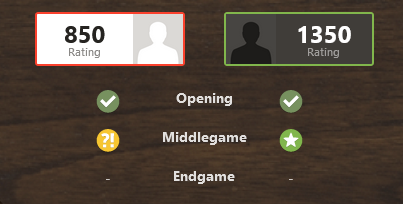
Another French opening. This time the Marshall Variation. The first shots fired were a pin from White with 9. Bg5?! Black’s response to this was 9…Nf5! A great move that threatened to win a bishop or, with accurate play, even a rook. Play continued with Black increasing space and positional advantage. Then came a painful fork for White with 15…Nc2+ winning the rook on a1. Black now had open diagonals for the queen and bishops to exploit. They flanked White on the queenside, and drove home the win with a with a quartet of tactics: a queen fork, a king skewer, an intermezzo rook trade, and a bishop fork for the coup de grâce.
Stephane Derveaux vs. Brian Bogart
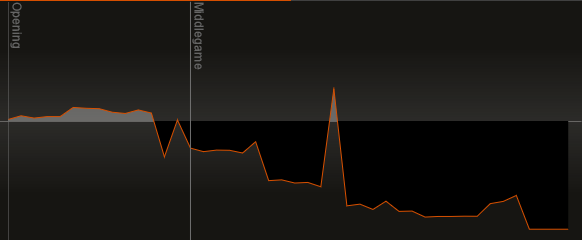

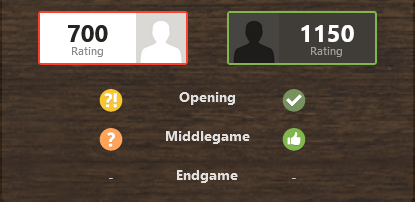
A dubious English Opening: Anglo-Indian, Anglo-Grünfeld Defense from both sides. Out of the opening White was steadily losing control, until 13…Nd4? where 14. Bxd3 would have given a positional advantage, won a pawn, developed the bishop, and secured the defense of the e4 pawn. 14. Nxd3 was played instead, hanging the e4 pawn and allowing both knights to infiltrate White’s territory. Moments later the threat from the knight on e4 was realized when 16. d3?! was played. Attempting to kick the e4 knight and defend their own knight on f4 allowed 16…Nc3! a knight fork winning the rook. This opened the door to a checkmate sequence. White’s best chance to reach a R+N vs. R+R endgame was 21. Qd1 instead of 21. Ne2? which couldn’t defend the battery on the c file.
Joseph Burns vs. Amin Eshtiaghi
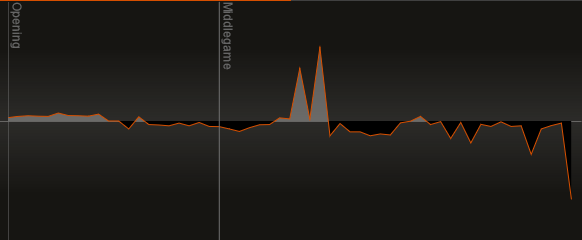

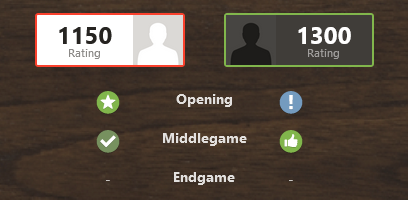
A competitive game with the Ruy Lopez: Morphy Defense opening which Black handled even better than white. The first move out of book was 7. Nxe5 which was good, but taking the knight with 7. Bxc6 was best. White was ok with this though: If 7…Nxa4?? there’s 8. Nxc3+!! winning the queen with a discovered check from the rook. Development continued well until 16. Rfe8?? where White had a sequence that would win a knight [17. Na4 Qd6 18. Nxc5 Qxc5 19. Qxf4! Qxc2 20. Be5] but that was hard to see. A completely even game throughout, White let it slip with 29. Qg6? losing time and defense. The finale wasn’t clearly recorded, but Black appears to have worked the queen in on the kingside to coordinate with a strong rook battery on the e file and deliver checkmate on g2.
David Ganassi vs. Billy Zifchak
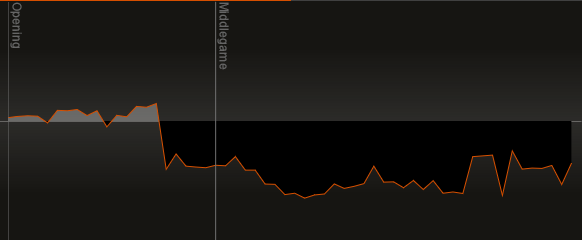

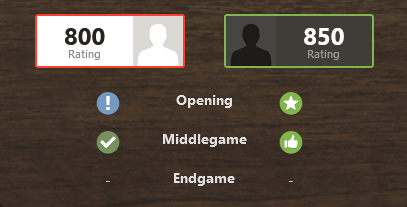
White went with the Ponziani Opening and things were looking good until 9. O-O?? Perhaps the knight guarding made it appear safe, but the b5 bishop was left out to dry (Black didn’t fully capitalize on the error [9…Bxc3 10. bxc3 cxb5]). Black continued playing normally but carefully and White defended very well almost regaining the lost material. It got very interesting on the 24th move. 24…g5? was less correct than 24…Be2 allowing 25. Qh5! winning tempo. Black retorted with 25…Be2! still great but a move late and was the only way to defend the knight and threaten a rook. (25…g4?? would have been a huge blunder with the bishop’s eye on h6.) White made a seemingly smart threat to trade rooks using that gained tempo to deliver a few queen checks, but the attack fizzled out in a closed position and time ran out. Interestingly for Black, when Black attacked the rook on move 25, the threat offered an incredible tactic, 26…Ng1! This would have revealed a huge fork and trapped the queen!
Brian Bogart vs. Alex Levy
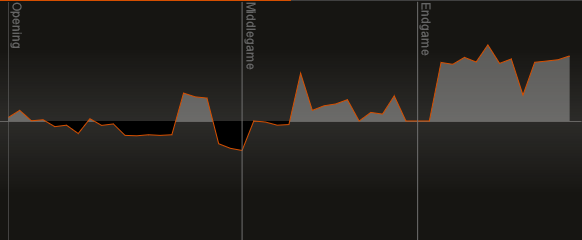

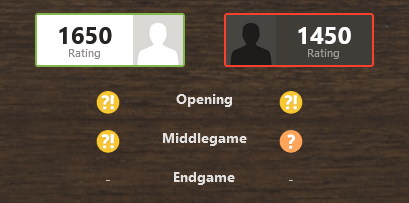
A balanced Pirc Defense opening, but a messy middlegame with tons of traded tactics that White managed to get the better of. Black came right out of the gate winning a rook on move 10. Undeterred, White pressed on regained composure and went on the attack. Things took a turn with 19…b5?? White’s pawns were in shambles and capturing another one on d3 was ideal whereas pawn to b5 lost time. White responded with a checkmate threat. Black’s best defense meant allowing the elusive en passant to erode their defenses. The last blunder (as often is the case) was 23…Bb7 coming a move late after the King advanced to f7 to stop a newly passed pawn. This permitted a knight fork leaving Black a much harder path to victory. Notation ended after that. It is assumed Black resigned there or shortly after.
Bobby Burstein vs. Josh Pinchuk
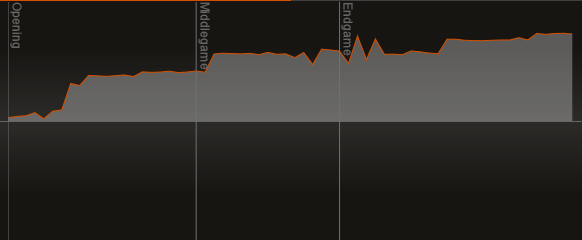

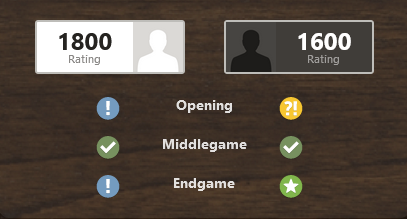
A very competitive game but White took advantage of opportunities in the opening. Here we had the Philidor Defense: Nimzowitsch Variation but the move 4…Be7?? allowed white to open the middle of the board and gain tempo. Black didn’t take back on e5 hoping to prevent a queen trade that would cancel castling rights, only to suffer that indignity a few moves later. By move 15 White was up only 2 pawns, but had a much better position. Things improved for Black as they simplified toward a knight v. bishop endgame. Unfortunately White had the knight and the pawns. Enough to severely restrict Black’s movement. Notation stopped here. White won either from time-out or resignation.
Billy Zifchak vs. Bobby Burstein
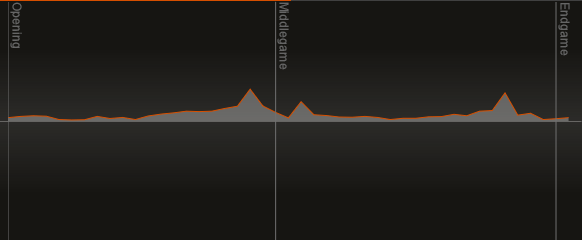

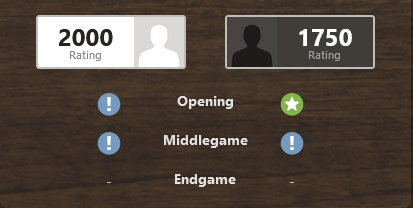
A really sharp game where both players had chances. White played remarkably well for their ranking, but an inability to see in the moment how well things were going undermined the end of the game. The opening in question was a Scotch Game: Classical, Potter Variation. Then there was a tense 20 moves with no blunders mistakes or inaccuracies. They tested for weaknesses and held tension over the center. Strong tactics were being carefully avoided. It was going to come down to creating small advantages, like the one White missed with 21. a3 neglecting to take a free pawn on a7. This was merely considered a “miss” but it certainly changed the game’s trajectory. Around the 5 minute mark Black began pulling out the stops desperately trying to open up the board, and simplify. Notation stopped on move 26 but the game continued where White was actually pulling ahead. In the end Black was moving so quickly and confidently that White rushed and blundered a knight exchange leaving them in a losing endgame. White resigned around move 35.
Amin Eshtiaghi vs. Billy Zifchak
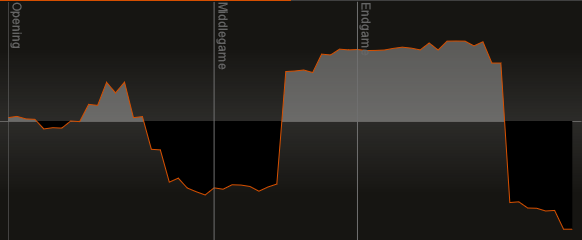


This final round game flip flopped 4 times! The Vienna Game: Max Lange Defense opening was balanced although 3. Qf3 was a little dubious and Black immediately responded with and aggressive 3. Nd4. White reassessed and pressed, gaining an edge trying to create diversions by attacking the bishop on c5 with 9. Na4?! followed by 10. c3? This allowed 10…b5! trapping that knight. White took 5 minutes to come to terms with this but again regrouped. Both continued carefully improving their positions when suddenly 16…Nxf4?? was played now costing Black a rook. White was back! Black was now reassessing and shoring up defenses, but White was struggling to make headway. Their king was somewhat open from the earlier destruction of the kingside pawn structure and Black was able to give some checks and gain tempo. White began advancing their pawns and Black tried to break them up with 28…Qxc3 threatening the rook. White missed this and played 29. dxc5?? and tables were turned yet again with 29…Qxa1+. A few moves later Black found a checkmate as the clocks were very close to zero.

